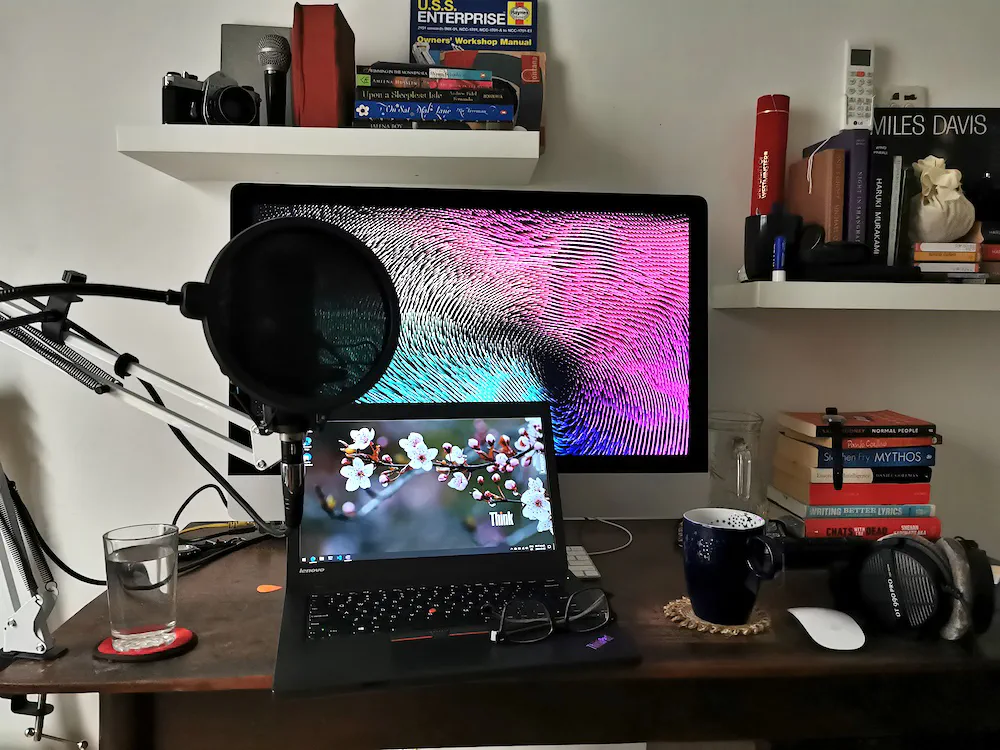Often when frustration hits me with my computing devices, those being an iMac and ThinkPad. I often wonder what my next computing device is going to be. Keeping aside a pledge of reusing my devices, mind often runs hypotheticals with different devices.

- iPad Pro with the M1 Chip.
- E-Paper tablet running Android.
These choices are not what traditional power-user devices may look like. I’m not alone when it comes to imagining the next personal computing device. There is an ongoing battle on what’s will be the next class of personal computing devices.
It’s not necessarily a departure from the PC, but a re-imagination of it.
Precursor To Personal Computing
Computers were never to be taken lightly, they won wars and put a man on the moon! The imagery created in a mind of boomer/early millennial of computers are large clean rooms with massive units. Attending to these expensive devices are men and women clad in white robes, entering data to these devices using punch-cards or printer-terminals.
In the late 70s and early 80s, personal computers were the rage. The killer apps came in the form of Spreadsheet apps such as VisiCalc and Lotus 1-2-3. The allure of being able to balance your own checkbook with a computer was really exciting for some. For others gaming and general human curiosity got them.
Personal Computers Are Trucks
I’m unsure if this is some running gag, but Walt Mossberg and Kara Swisher hosts of All Things Digital keep asking Apple folks why the iPad isn’t feature rich and general purpose. At the D8 Conference late CEO of Apple Computer, Steve Jobs put forth a great analogy to justify this.
When we were an agrarian nation, all cars were trucks because that’s what you needed on the farms. … “PCs are going to be like trucks,” Jobs said. “They are still going to be around.” However, he said, only “one out of x people will need them.”
- Steve Jobs
The general purpose computer was really a product of it’s time. The thought being that, for the development of a new digital world, people required the heavy lifting trucks(computers).
Present time, people don’t require full-fledged computers to get-by in their every day life. Most workloads of computers for communication and collaboration is achievable via a web-browser. For example using a Chromebook.
The Mobile vs PC Identity crisis
Modern mobile computers are great, they are accessible and intuitive. Gone are the baggage of the backwards compatible PC and introduced are touch displays, always connected internet, and a suite of application that is easy to use anywhere!
My mum loves em! (smartphones) Hates computers, ironic, but a shared sentiment with many.
Tablets taking the place of PC’s is an often a debated subject. Let’t take Apple’s iPad as an example. Apple, is clearly conflicted on it’s place in the post-pc era.
Apple is careful when making the iPad more flexible. In trying to do so, a new line of devices appeared, the iPad Pro. Marketing material talks about how “Your new computer is not a computer”. As for the argument of the iPad Pro, with it’s “professionals” focus and high price point, it’s more of a luxury device at the moment.
re: baggage, some PC features are very esoteric. As an example, what would a five-year-old understand if presented with, A tablet or a PC? Would it be the abstract cursor system of a PC or the finger optimized interface on a touch screen? Easy bet on the latter.
The Re-Imagining
It’s clear that a re-invention of the device is required. Let’s see what most users are looking for in modern computing devices.
- Mobility in design and function
- Power Efficiency
- Always Connected
With these basic factors in mind, It’s apparent how the traditional PC suffers on those topics. Traditionally computers weren’t required to be mobile and power efficient, the ecosystem is built on a base that’s not reflective of how modern devices are used.
It’s not just the hardware that’s not suitable, it’s the software as well.
Especially, letting go of the mouse is a hard one, that’s where most of the UX issues for touch crop-up. A decrease of input resolution needs to be considered. I believe, device manufacturers are taking the correct step for forking of mobile operating systems and hardware as the aforementioned points are addressed from the get-go.
Conclusion
The PC will be present in the future. But its usage will be left for specialist workflows. Most standard productivity and learning can be accomplished with the likes of a tablet. This will make the many facets of computing accesible 🤞.
In retrospective, Windows 8 Tablets were bridge devices! Which were able to operate on in touch mode but was still able to be standard PC. Unfortunatley that didn’t pan out well, maybe Windows 11 will achieve that.
So what’s my dream computing device going to be? I’ll wait for now…